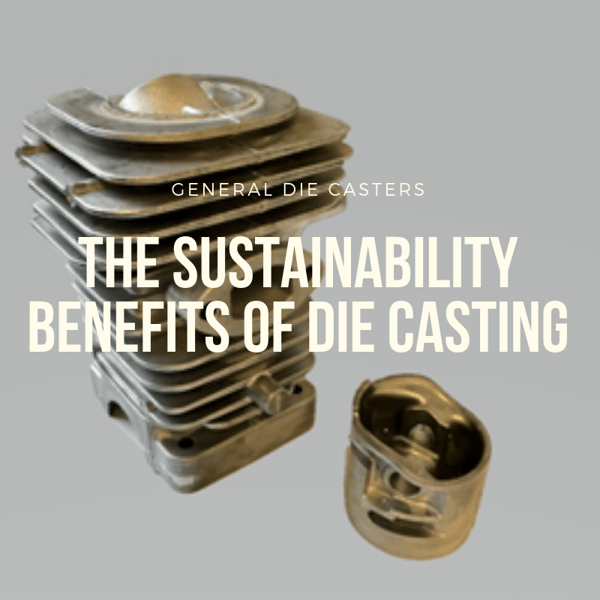
The global demand for environmentally sustainable manufacturing practices is growing rapidly. However, the plastic waste problem is outpacing this growth, with a small portion of used plastic even making it into the recycle stream. The remainder ends up in landfills, being burned or dumped into the ocean. Among the many manufacturing methods utilized today, die casting has remained one of the most ecologically sustainable processes out there. Below, learn why the aluminum die casting process is eco-friendly and how it compares to other manufacturing processes; such as injection molding, extrusion and sand casting.
Recyclability
Manufacturers appreciate that aluminum is infinitely recyclable. Only a small percentage of aluminum is lost to oxidation when it is melted properly.
Aluminum has a well-established secondary market across the globe to support aluminum recycling. 95% of aluminum die castings produced in North America are made from recycled material.
Aluminum is also easily removed from other recycle streams. Unlike plastic, very little aluminum that enters the recycle stream is wasted.
Aluminum also doesn’t need to be separated by type like plastic. A smelter will produce a batch of aluminum die casting alloy using everything from cans to automotive parts.
Not all aluminum manufacturing processes boast this level of recyclability. The aluminum forging and extrusion processes use primary aluminum. Aluminum is the most prevalent metal on the earth’s crust and the third most abundant element after oxygen and silicon. Unfortunately, it is never found in its elemental form due to its high level reactivity with oxygen. The most common source of aluminum is the mineral Bauxite. Primary aluminum is produced by mining and extracting aluminum from bauxite using several processes. It requires 4 tons of bauxite to produce 1 ton of aluminum. The mining and extraction process requires tremendous energy and has a significant environmental impact. Processes that use secondary recycled aluminum are much better options for these reasons.
Durability
An aluminum casting will outperform a similar plastic molded component. Plastic, by definition, will deform and not return to its original state. While plastic is a wonderful product in many applications, it will not withstand much external stress without failure. A damaged plastic component can easily cause catastrophic failure of a product and create a frustrated consumer. Aluminum, on the other hand, possesses fantastic mechanical properties that allow it to withstand abuse without failing.
The die casting process is also uniquely energy-efficient in comparison to other metal casting methods. For example, sand casting requires a sand mold which is only suitable for one-time use. The sand mold, which is non-reusable, wastes considerable energy in production. In comparison, die casting molds can be used up to 100,000 times before replacement. Choosing a die cast aluminum part over plastic increases the life of the entire product. This reduces the energy and material required to manufacture replacements.
Light Weight
While plastic weighs less than aluminum per cubic foot, aluminum is much stronger. An aluminum casting can be produced with much thinner walls than an equivalent plastic component to achieve the same strength. This often negates much of the weight disadvantage of using aluminum over plastic.
Complex Geometries
Die casting technology allows castings to be produced with very complicated geometries. An aluminum die casting can often replace several components made from steel and plastic. This minimizes the overall environmental impact and cost to manufacture your product.
Net Shape
Die castings can be produced with very accurate and repeatable dimensions. This minimizes secondary operations required for the part to meet its functional requirements.
Our generation has the challenge of reconciling economic growth while preserving our planet. The realities of plastic are becoming clear. Scientists predict by mid-century the oceans will contain more plastic than fish. We must prioritize environmental sustainability by designing and building products to be durable and reusable out of recyclable materials.
Aluminum die cast parts check all the boxes.


